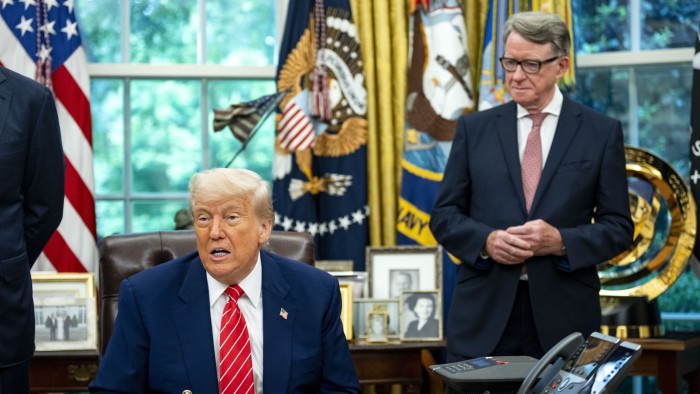The UK has clinched the first deal with the US since Donald Trump ignited a trade war, winning cuts to punitive tariffs on car and steel exports but failing to reverse a flat 10 per cent levy that applies to most goods.
The pact was unveiled by the US president in the Oval Office, with the UK prime minister joining by phone, and both leaders effusively praised the strength of the relationship between the two countries.
But the scope of the US-UK deal is limited, many of the details have to be ironed out and the end result still leaves Britain facing a tougher trading relationship with America than before Trump introduced sweeping global tariffs last month.
US stocks rose following the announcement, with investors encouraged by the prospect of further deals to limit the damage of the levies that have choked trade. The S&P 500 rose more than 1 per cent, to its highest intraday level since March 27.
The US-UK agreement, described by Trump as “full and comprehensive”, will keep in place the 10 per cent American levies on most British exports that Trump imposed last month.
But it crucially offers the UK a reprieve from the extra 25 per cent tariffs on cars and metals that had been previously set by the Trump administration and were of particular strain to Britain.
British exports of steel and aluminium will now be zero rated for tariffs while the first 100,000 UK cars sold in the US annually — the vast majority of the total — will be subject to a reduced 10 per cent levy.
“This historic deal delivers for British business and British workers, protecting thousands of British jobs in key sectors including car manufacturing and steel,” Starmer said.
In exchange, the UK will offer US farmers and ranchers improved market access through a lower-tariff quota system, but without altering its food standards, paving the way for some beef imports. The UK will remove its tariff on US ethanol, used to produce beer.
“Our biggest concern is that . . . agricultural sectors have been singled out to shoulder the heavy burden of the removal of tariffs for other industries in the economy,” said Tom Bradshaw, president of the UK National Farmers’ Union.
Trump and Starmer’s teams also agreed to work on a digital trade pact to deepen co-operation and to address US concerns about the UK’s digital services tax targeting Big Tech, which stays in place for now.
“The US and UK have been working for years to try and make a deal, and it never quite got there. It did with this prime minister,” Trump said at the White House, flanked by JD Vance, the vice-president, Howard Lutnick, the US commerce secretary, and Lord Peter Mandelson, the UK ambassador to Washington.
Addressing workers at the Jaguar Land Rover factory in the West Midlands, Starmer said the accord was the start of a process. “This is jobs saved, not job done,” he said. “We will continue to build on this agreement.”
He said he had also negotiated “preferential treatment” for the UK if Trump decides in future to raise tariffs on pharmaceuticals or other sectors, including film.
But Andrew Griffith, Conservative trade spokesman, said the agreement was disappointing, calling it “a Diet Coke deal, not the real thing”. Tory leader Kemi Badenoch said: “We’ve just been shafted.”
The US accord with the UK could provide a template for American negotiations with other countries — with India, Vietnam, Japan and South Korea seen as the closest to agreements with Washington.
But Trump warned the US would insist that overall levies on countries with large trade surpluses with America could remain well over 10 per cent. “Some will be much higher,” Trump said. “The template of 10 is probably the lowest,” he added.
Important talks are set to be held this week in Switzerland between Scott Bessent, the US Treasury secretary, and senior Chinese officials, to try to de-escalate the tariff war between the world’s two largest economies, which has weighed on markets and threatened global supply chains.
“I will tell you that China very much wants to make a deal. We’ll see how that works out,” Trump said. When asked if he would consider lowering US tariffs on Chinese imports, Trump replied: “Right now, you can’t get any higher. It’s at 145 [per cent], so we know it’s coming down.”
The US-UK deal raised questions among legal and trade experts over whether it was in keeping with World Trade Organization rules that require tariffs to be applied equally.
Ignacio García Bercero, a former senior European Commission official now at the Bruegel think-tank, said the UK decision to cut tariffs for US exporters without extending the same deal to other countries risked legal challenges. Under the WTO’s “most favoured nation” concept, countries must offer the same tariffs rates to all countries, unless they are reduced via a bilateral trade deal that covers “substantially all trade”, which the UK-US pact announced on Thursday does not.
“It is concerning if the UK has offered preferential tariff concessions to the US. In the absence of any commitment by the US to eliminate tariffs on other countries, this cannot be justified,” Bercero added.
But one trade lawyer, who declined to be named, pointed out that WTO rules allow trade deals to be phased in. “They could say it’s the beginning of free trade agreement negotiations and then take 10 to 15 years to ‘conclude’,” they said.
Additional reporting by Kate Duguid in New York




